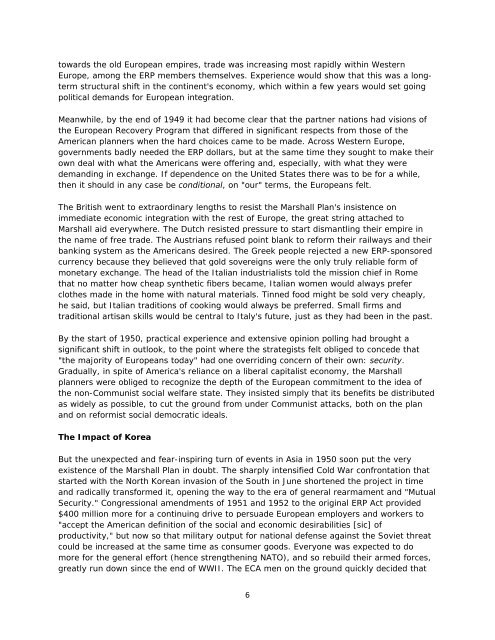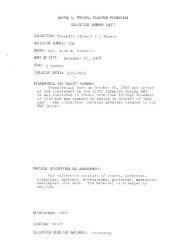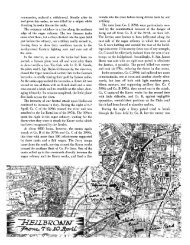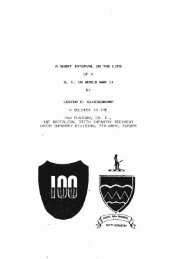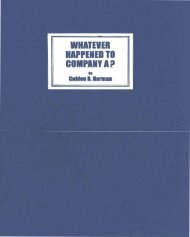The Marshall Plan: A Strategy that Worked A new American project ...
The Marshall Plan: A Strategy that Worked A new American project ...
The Marshall Plan: A Strategy that Worked A new American project ...
You also want an ePaper? Increase the reach of your titles
YUMPU automatically turns print PDFs into web optimized ePapers that Google loves.
towards the old European empires, trade was increasing most rapidly within Western<br />
Europe, among the ERP members themselves. Experience would show <strong>that</strong> this was a longterm<br />
structural shift in the continent's economy, which within a few years would set going<br />
political demands for European integration.<br />
Meanwhile, by the end of 1949 it had become clear <strong>that</strong> the partner nations had visions of<br />
the European Recovery Program <strong>that</strong> differed in significant respects from those of the<br />
<strong>American</strong> planners when the hard choices came to be made. Across Western Europe,<br />
governments badly needed the ERP dollars, but at the same time they sought to make their<br />
own deal with what the <strong>American</strong>s were offering and, especially, with what they were<br />
demanding in exchange. If dependence on the United States there was to be for a while,<br />
then it should in any case be conditional, on "our" terms, the Europeans felt.<br />
<strong>The</strong> British went to extraordinary lengths to resist the <strong>Marshall</strong> <strong>Plan</strong>'s insistence on<br />
immediate economic integration with the rest of Europe, the great string attached to<br />
<strong>Marshall</strong> aid everywhere. <strong>The</strong> Dutch resisted pressure to start dismantling their empire in<br />
the name of free trade. <strong>The</strong> Austrians refused point blank to reform their railways and their<br />
banking system as the <strong>American</strong>s desired. <strong>The</strong> Greek people rejected a <strong>new</strong> ERP-sponsored<br />
currency because they believed <strong>that</strong> gold sovereigns were the only truly reliable form of<br />
monetary exchange. <strong>The</strong> head of the Italian industrialists told the mission chief in Rome<br />
<strong>that</strong> no matter how cheap synthetic fibers became, Italian women would always prefer<br />
clothes made in the home with natural materials. Tinned food might be sold very cheaply,<br />
he said, but Italian traditions of cooking would always be preferred. Small firms and<br />
traditional artisan skills would be central to Italy's future, just as they had been in the past.<br />
By the start of 1950, practical experience and extensive opinion polling had brought a<br />
significant shift in outlook, to the point where the strategists felt obliged to concede <strong>that</strong><br />
"the majority of Europeans today" had one overriding concern of their own: security.<br />
Gradually, in spite of America's reliance on a liberal capitalist economy, the <strong>Marshall</strong><br />
planners were obliged to recognize the depth of the European commitment to the idea of<br />
the non-Communist social welfare state. <strong>The</strong>y insisted simply <strong>that</strong> its benefits be distributed<br />
as widely as possible, to cut the ground from under Communist attacks, both on the plan<br />
and on reformist social democratic ideals.<br />
<strong>The</strong> Impact of Korea<br />
But the unexpected and fear-inspiring turn of events in Asia in 1950 soon put the very<br />
existence of the <strong>Marshall</strong> <strong>Plan</strong> in doubt. <strong>The</strong> sharply intensified Cold War confrontation <strong>that</strong><br />
started with the North Korean invasion of the South in June shortened the <strong>project</strong> in time<br />
and radically transformed it, opening the way to the era of general rearmament and "Mutual<br />
Security." Congressional amendments of 1951 and 1952 to the original ERP Act provided<br />
$400 million more for a continuing drive to persuade European employers and workers to<br />
"accept the <strong>American</strong> definition of the social and economic desirabilities [sic] of<br />
productivity," but now so <strong>that</strong> military output for national defense against the Soviet threat<br />
could be increased at the same time as consumer goods. Everyone was expected to do<br />
more for the general effort (hence strengthening NATO), and so rebuild their armed forces,<br />
greatly run down since the end of WWII. <strong>The</strong> ECA men on the ground quickly decided <strong>that</strong><br />
6


